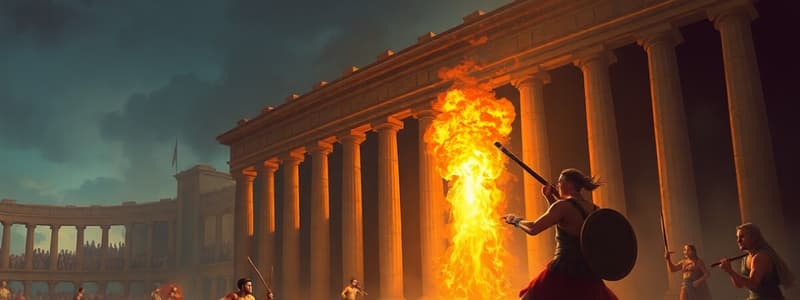Podcast
Questions and Answers
What type of seating arrangement is described for the spectators at the games?
What type of seating arrangement is described for the spectators at the games?
- Senators at the front, women and slaves at the back (correct)
- Slaves and women at the front, senators at the back
- No specific seating arrangement mentioned
- Equal seating for all classes of people
What does the wooden sword signify for the victorious gladiator?
What does the wooden sword signify for the victorious gladiator?
- The gladiator will train others
- The gladiator has won his freedom (correct)
- The gladiator will participate in more battles
- The gladiator has been granted a medal
How does the narrator initially feel about the location of their seating at the games?
How does the narrator initially feel about the location of their seating at the games?
- Indifferent, as they can't see well anyway
- Disappointed to be far from the fights (correct)
- Proud to be among the elite
- Excited to be so close to the action
What type of gladiators are mentioned in the first match described?
What type of gladiators are mentioned in the first match described?
What aspect of the games contributes to the narrator's shame at the end of the spectacle?
What aspect of the games contributes to the narrator's shame at the end of the spectacle?
What was the surprise that the master revealed after the games?
What was the surprise that the master revealed after the games?
What did the narrator's mistress say to comfort her during the fight's climax?
What did the narrator's mistress say to comfort her during the fight's climax?
What was the emotional state of the narrator as they left the amphitheater?
What was the emotional state of the narrator as they left the amphitheater?
Flashcards
Gladiators
Gladiators
Trained slaves who fought in public contests in an arena.
Munera
Munera
Public entertainment, often including gladiatorial combats.
Amphitheatre
Amphitheatre
A large, open-air venue for public spectacles, such as gladiatorial games.
Emperor's Gift
Emperor's Gift
Signup and view all the flashcards
Wooden Token
Wooden Token
Signup and view all the flashcards
Tiered Seating
Tiered Seating
Signup and view all the flashcards
Wild Animals
Wild Animals
Signup and view all the flashcards
Trainer of Beasts
Trainer of Beasts
Signup and view all the flashcards
Study Notes
Day II of the Month of September
- Author attended gladiatorial games (munera)
- Games were real battles between slaves (gladiators)
- Gladiators used razor-sharp weapons
- Games were a gift from the emperor
- Part of the celebration of the Dacian triumph
- Games took place in a large, open oval arena
- Seating had tiers, front rows reserved for senators
- Highest tier for women and slaves
- Author's mistress gave her a wooden token for a seat
Gladiatorial Games - Specific Match
- First match was between a net-man and a pursuer
- Pursuer fought bravely, but grew exhausted
- Net-man cornered pursuer and waited for signal
- Emperor spared the defeated man and rewarded the winner
- Reward was a wooden sword
- Significance of the reward: freedom for the defeated gladiator
Spectacle Observations
- Author initially disappointed with distance
- Glad/Releived about their seats
- Unable to smell blood or see the fear on gladiator faces
- Mistress pointed out the crowd's importance to emperor
- Emperor would listen to the crowd
Second Page - Additional Observations
- Author enjoyed the spectacle after the initial match
- Crowd's roaring sound created a sense of energy/swept along
- Author felt ashamed after the games
- Met master; master led them to a basement below the arena
- Observed lions, tigers, and leopards in their cages
- Beasts were terrified of gladiators; a contrast of excitement with sadness/deep thought.
Studying That Suits You
Use AI to generate personalized quizzes and flashcards to suit your learning preferences.




